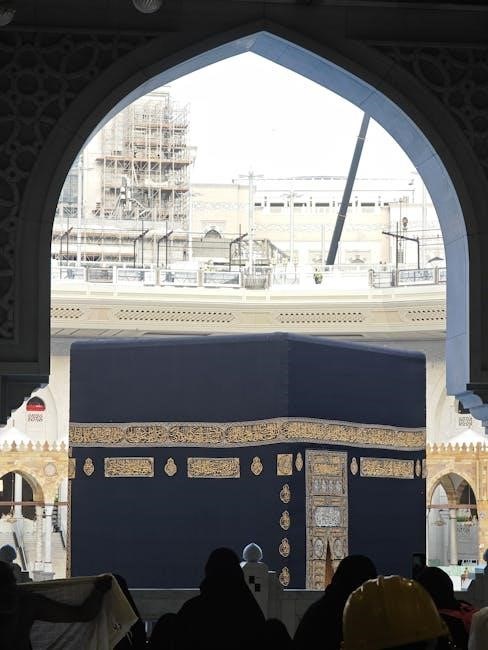Saudi Arabia’s scholar manuals are curated educational resources designed to align with the national curriculum, integrating Islamic values, Arabic heritage, and modern educational methodologies to foster holistic student development.
1.1 Overview of Scholar Manuals in Saudi Arabia
Scholar manuals in Saudi Arabia serve as comprehensive educational resources, designed to support students across various academic levels. They cover a wide range of subjects, including Islamic studies, Arabic language, mathematics, and science, while aligning with the national curriculum. These manuals are developed to foster critical thinking, cultural awareness, and religious values, ensuring a balanced education. The Saudi Ministry of Education plays a central role in their creation, updating content to meet modern educational needs and align with the country’s Vision 2030 goals.
1.2 Historical Background of Educational Manuals in Saudi Arabia
The development of scholar manuals in Saudi Arabia traces back to the early 20th century, following the establishment of the Kingdom in 1932. Initially, education was heavily influenced by Islamic teachings, with manuals focused on religious texts and Arabic language studies. The 1950s saw the introduction of state-funded schools, leading to the creation of standardized educational materials. The Saudi Ministry of Education, formed in 1953, played a pivotal role in formalizing these manuals, ensuring they aligned with Islamic principles and cultural values. Over time, these resources have evolved to incorporate modern subjects while maintaining their historical roots.
1.3 Importance of Scholar Manuals in the Saudi Education System
Scholar manuals serve as foundational tools in Saudi Arabia’s education system, providing structured content that aligns with national curriculum goals. They ensure consistency in teaching and learning, making education accessible and equitable across regions. These manuals emphasize Islamic values, Arabic language preservation, and cultural identity, fostering a sense of national unity. Additionally, they support the integration of modern subjects, preparing students for a rapidly changing world. Their role extends to teacher guidance, enabling educators to deliver effective lessons and assess student progress, thereby strengthening the overall educational framework.
Structure and Content of Saudi Scholar Manuals
Saudi scholar manuals are organized into primary, secondary, and higher education levels, incorporating Islamic education, modern subjects, and cultural values, ensuring alignment with national educational goals.
2.1 Primary Education Manuals
Primary education manuals in Saudi Arabia are designed to provide a foundational understanding of core subjects, blending Islamic principles with basic literacy and numeracy skills. These manuals emphasize the importance of the Arabic language, Islamic studies, and cultural heritage, ensuring a strong moral and academic base. They are structured to cater to different age groups, focusing on simplicity and clarity to facilitate easy learning. The content is carefully curated to promote critical thinking and prepare students for higher levels of education, aligning with the country’s educational vision and societal values.
2.2 Secondary Education Manuals
Secondary education manuals in Saudi Arabia focus on advanced learning, preparing students for higher education and future careers. These manuals cover a wide range of subjects, including mathematics, science, language arts, and Islamic studies, ensuring a balanced curriculum. They incorporate modern teaching methods and technologies to enhance learning outcomes. Special emphasis is placed on critical thinking, problem-solving, and vocational skills to align with the nation’s Vision 2030 goals. These manuals also integrate Islamic values and cultural heritage, fostering a well-rounded education that prepares students for both academic and professional success.
2;3 Higher Education Manuals
Higher education manuals in Saudi Arabia are designed to meet the advanced academic and professional needs of students. These manuals emphasize specialized knowledge, critical thinking, and research skills across disciplines like engineering, medicine, and business. Aligned with Vision 2030, they focus on innovation, entrepreneurship, and global competitiveness. Manuals incorporate modern technologies and interactive learning tools to enhance engagement. They also emphasize Islamic values and cultural heritage, ensuring a blend of tradition and modernity. The goal is to produce graduates equipped to contribute to Saudi Arabia’s economic and social development in a rapidly changing world.

Curriculum Development in Saudi Arabia
Vision 2030 guides Saudi curriculum development, blending Islamic education with modern subjects to foster innovation and global competitiveness, aligned with national goals and societal needs.
3.1 Islamic Education in Scholar Manuals
Islamic education is a cornerstone of Saudi scholar manuals, emphasizing Quranic teachings, Islamic values, and Arabic heritage. These manuals integrate religious principles into all subjects, ensuring moral and cultural alignment while promoting the Arabic language and history. The curriculum is designed to foster a deep understanding of Islam, shaping students’ identities and ethical frameworks. This approach ensures harmony between modern education and traditional Islamic values, reflecting Saudi Arabia’s commitment to preserving its cultural and religious heritage in a rapidly changing world.
3.2 Integration of Modern Subjects in Curriculum
Saudi scholar manuals have introduced modern subjects like science, technology, engineering, and mathematics (STEM) to align with global educational standards. This integration aims to prepare students for the 21st century by fostering critical thinking, innovation, and problem-solving skills. Modern subjects are taught alongside Islamic values, ensuring a balanced education that respects cultural heritage while embracing progress. The inclusion of digital literacy and foreign languages, such as English, reflects Saudi Arabia’s commitment to global connectivity and economic development under Vision 2030.
3.3 Role of the Saudi Ministry of Education in Curriculum Development
The Saudi Ministry of Education plays a pivotal role in shaping scholar manuals by setting educational standards, aligning curricula with national goals, and ensuring Islamic values are integrated. It collaborates with experts to design manuals that reflect modern educational trends while preserving cultural heritage. The Ministry also oversees the implementation of Vision 2030, focusing on skills like critical thinking and digital literacy. Regular updates to the curriculum are made to meet global educational benchmarks, ensuring students are well-prepared for future challenges.
Teaching Methodologies in Saudi Scholar Manuals
Saudi scholar manuals emphasize a blend of traditional and modern teaching methods, incorporating Islamic values with contemporary educational techniques. Technology integration enhances adaptability and engagement in learning processes.
4.1 Traditional Teaching Methods
Traditional teaching methods in Saudi scholar manuals often involve memorization of Islamic texts and cultural heritage. These methods emphasize discipline, respect for authority, and a focus on rote learning. The approach is deeply rooted in Islamic education, where students are encouraged to memorize the Quran and Hadith. Lecture-based formats are common, with teachers delivering information and students engaging through repetition and recitation. These methods are seen as effective for preserving cultural and religious values, while also fostering a strong foundation in Arabic language and literature. They remain influential in shaping the educational landscape of Saudi Arabia.
4.2 Modern Teaching Approaches
Modern teaching approaches in Saudi Arabia emphasize interactive learning, critical thinking, and student-centered methodologies. These methods incorporate technology, such as digital platforms and multimedia resources, to enhance engagement. Project-based learning and collaborative activities are increasingly adopted to foster creativity and problem-solving skills. The integration of global perspectives and cross-cultural awareness is also a key focus, aligning with Vision 2030 goals. These approaches aim to prepare students for a rapidly changing world while maintaining cultural and religious values, ensuring a balanced and progressive educational experience.
4.3 Use of Technology in Education
Technology plays a pivotal role in modernizing Saudi education, with digital tools and online platforms enhancing teaching and learning. Learning Management Systems (LMS) and educational apps are widely adopted to provide interactive content and real-time feedback. Digital resources, such as multimedia and virtual labs, cater to diverse learning styles. The integration of technology supports personalized learning experiences and prepares students for future challenges. This aligns with Saudi Arabia’s Vision 2030, aiming to create a tech-savvy workforce and foster innovation in education, ensuring students are equipped with 21st-century skills for global competitiveness.

Assessment and Evaluation in Saudi Education
Saudi Arabia’s education system employs standardized testing and digital tools to assess student performance, aligning with Vision 2030 goals to enhance educational outcomes and continuous innovation.
5.1 Examination Systems in Saudi Arabia
The examination system in Saudi Arabia is centralized, with standardized tests assessing student performance at various educational levels. These exams are designed to measure mastery of curriculum content, ensuring alignment with national educational goals. Digital platforms are increasingly used to enhance exam administration, improving transparency and efficiency. The system emphasizes critical thinking and problem-solving skills, reflecting broader educational reforms under Vision 2030. Regular assessments and final exams are key components, aiming to prepare students for higher education and the workforce while maintaining high academic standards.
5.2 Grading and Evaluation Criteria
The grading system in Saudi Arabia emphasizes consistency and transparency, with clear criteria for evaluating student performance. Academic achievements are measured through a combination of quizzes, assignments, and final exams, ensuring a holistic assessment. The Ministry of Education sets standardized grading scales, reflecting both academic and religious education alignment. Evaluations focus on critical thinking, problem-solving, and adherence to Islamic values, fostering a well-rounded educational framework. Digital tools enhance the grading process, ensuring accuracy and fairness while preparing students for future academic and professional challenges.
5.3 Role of Quizzes and Assignments
Quizzes and assignments play a pivotal role in the Saudi education system, serving as formative assessments to monitor student progress. These tools help reinforce learning, identify knowledge gaps, and develop critical thinking skills. Regular quizzes ensure consistent engagement with course material, while assignments encourage independent study and application of concepts. Both methods are integral to preparing students for final examinations and fostering a deeper understanding of subjects. They also promote accountability and time management, contributing to the overall effectiveness of the educational framework in Saudi Arabia.

Cultural and Religious Influences on Scholar Manuals
Saudi scholar manuals heavily reflect Islamic values and Arabic cultural heritage, ensuring educational content aligns with the kingdom’s religious and cultural identity, promoting moral and societal cohesion.
6.1 Islamic Values in Educational Content
Saudi scholar manuals place a strong emphasis on Islamic values, ensuring that educational content aligns with religious principles and moral teachings. The integration of Islamic education is central, with subjects like Quranic studies and Islamic history being mandatory. These manuals promote a holistic approach to learning, blending academic knowledge with ethical and spiritual development. By incorporating Islamic values, the curriculum aims to nurture students’ moral character and foster a sense of identity and responsibility. This approach ensures that education not only equips students with knowledge but also guides them in becoming ethical and socially conscious individuals.
6.2 Cultural Sensitivity in Teaching Materials
Saudi scholar manuals prioritize cultural sensitivity, ensuring that teaching materials reflect the nation’s rich heritage and societal norms. These manuals are designed to incorporate local customs, traditions, and values, making learning relevant and relatable for students. The integration of Arabic language and Islamic culture is emphasized, while also addressing diverse student needs. The Ministry of Education reviews content to ensure it aligns with cultural expectations, fostering an inclusive and respectful learning environment. This approach promotes cultural awareness and pride, preparing students to contribute positively to their society while respecting its traditions and values.
6.3 Promotion of Arabic Language and Heritage
The promotion of Arabic language and heritage is a cornerstone of Saudi scholar manuals. These resources emphasize the importance of Arabic as the nation’s official language and a key component of cultural identity. Manuals incorporate classical Arabic texts, historical narratives, and cultural traditions to ensure students develop a deep understanding of their heritage. By integrating Arabic language instruction with cultural studies, the manuals aim to preserve Saudi Arabia’s linguistic and historical legacy while fostering pride and appreciation among students, aligning with the nation’s broader goals of cultural preservation and alignment with Vision 2030 objectives.
Challenges in Implementing Scholar Manuals
Challenges include resource allocation, outdated materials, and the digital divide, hindering effective implementation and accessibility of scholar manuals across diverse educational settings in Saudi Arabia.
7.1 Barriers to Education in Rural Areas
Rural areas in Saudi Arabia face significant challenges in implementing scholar manuals due to limited internet access, outdated educational materials, and a lack of trained teachers. Additionally, cultural and geographical barriers, such as remote locations and transportation difficulties, further hinder the effective distribution and use of these resources. Socio-economic factors also play a role, as many rural communities struggle with limited infrastructure and resources, creating disparities in educational opportunities compared to urban areas.
7.2 Challenges in Modernizing Educational Content
Modernizing educational content in Saudi Arabia’s scholar manuals faces challenges such as outdated materials, limited technological integration, and cultural sensitivities. Balancing traditional Islamic values with contemporary educational demands requires careful adaptation. Additionally, the slow pace of curriculum updates and the need for teacher training in new methodologies complicate the process. Ensuring alignment with Vision 2030 goals while addressing regional disparities further adds complexity. These challenges highlight the need for a structured approach to enhance the quality and relevance of educational resources.
7.3 Teacher Training and Development
Teacher training and development are critical for effectively implementing scholar manuals in Saudi Arabia. Programs focus on enhancing educators’ skills in using modern methodologies and digital tools. The Ministry of Education offers workshops to align teaching practices with Vision 2030 goals, emphasizing innovation and student-centered learning. However, challenges like outdated teaching practices and the need for continuous professional development persist. Upskilling teachers ensures they can deliver content effectively, addressing the evolving educational landscape and improving student outcomes.
Reforms and Innovations in Saudi Education
Saudi Arabia’s education system is undergoing transformative reforms through Vision 2030, emphasizing digital integration, modern teaching methods, and STEM education to foster innovation and global competitiveness. These initiatives aim to enhance learning outcomes and prepare students for future challenges.
8.1 Vision 2030 and Educational Reforms
Vision 2030 is driving transformative educational reforms in Saudi Arabia, focusing on modernizing the curriculum, integrating technology, and promoting STEM education. The initiative aims to align education with economic goals, fostering innovation and global competitiveness. It emphasizes critical thinking, creativity, and skill development to prepare students for future challenges. The reforms also include partnerships with international institutions to enhance educational quality and accessibility, ensuring Saudi Arabia’s youth are equipped to lead in a rapidly changing world while preserving Arabic language and cultural heritage.
8.2 Digital Transformation in Education
Digital transformation in Saudi education involves integrating advanced technologies like AI, big data, and virtual classrooms. This shift enhances learning experiences, offering personalized education and remote accessibility. The use of digital tools improves engagement, while online platforms provide resources for diverse learning needs. The transformation aligns with Vision 2030, aiming to build a tech-savvy workforce. By leveraging digital solutions, Saudi Arabia is modernizing its education system, ensuring students are prepared for a digital future while maintaining cultural values and promoting lifelong learning opportunities.
8.3 International Collaborations and Partnerships
Saudi Arabia is actively engaging in international collaborations to enhance its education system. Partnerships with global universities and organizations aim to improve educational quality and faculty development. These collaborations focus on exchanging knowledge, fostering innovation, and aligning Saudi education with global standards. Initiatives such as student exchange programs and joint research projects are prioritized. By leveraging international expertise, Saudi Arabia seeks to create a more competitive and globally oriented education system, aligning with Vision 2030 goals to drive sustainable development and cultural exchange.
Future Trends in Saudi Scholar Manuals
Future trends include personalized learning, globalization of content, and sustainability education, aligning with Vision 2030 to foster innovation and global competitiveness in Saudi education.
9.1 Personalized Learning Experiences
Personalized learning experiences in Saudi scholar manuals aim to tailor education to individual student needs, leveraging technology like AI to adapt content and pace. This approach ensures students engage deeply with material, fostering better understanding and outcomes. By integrating data analytics, manuals can track progress and identify areas for improvement, enabling targeted support. Competency-based progression and interactive content further enhance this model, aligning with Vision 2030’s goals for a modern, adaptive education system that prepares students for future challenges.
9.2 Globalization of Educational Content
Globalization of educational content in Saudi Arabia is transforming scholar manuals by integrating international perspectives and standards. This shift aligns with Vision 2030, aiming to prepare students for a globalized world. Modern digital platforms enable access to diverse resources, fostering cross-cultural understanding. Partnerships with global institutions enhance curriculum relevance, ensuring students meet international academic benchmarks. This approach not only enriches learning experiences but also equips students with skills for global competitiveness, promoting Saudi Arabia’s role in the international educational landscape while preserving cultural identity.
9.3 Sustainability and Environmental Education
Saudi Arabia’s scholar manuals increasingly emphasize sustainability and environmental education, aligning with global efforts to promote eco-consciousness. These resources incorporate lessons on environmental stewardship, conservation, and climate change, fostering a culture of sustainability among students. Interactive modules and case studies encourage critical thinking about resource management and eco-friendly practices. Vision 2030 further supports this integration, aiming to prepare students to address environmental challenges responsibly. By embedding sustainability into curricula, Saudi Arabia nurtures future generations equipped to contribute to a greener, more sustainable world while preserving natural resources for future societies.

